The average number of daily COVID-19 cases being reported in the U.S. has reached a six-month high as the Indian ‘Delta’ variant continued to spread across the country.
On Wednesday, officials recorded 106,557 new cases of the virus with a seven-day rolling average of 90,576, according to data from Johns Hopkins University.
This represents a 283 percent from the average of 23,613 reported three weeks ago and is the highest figure seen since February 14, when the average sat at 94,551, according to a DailyMail.com analysis.
Every state – aside from Kansas – and the District of Columbia have seen infections either increase or remain steady in the last seven days.
Deaths, which are a lagging indicator, are also starting to tick upward.
There were 616 virus-related fatalities recorded on Wednesday with a seven-day rolling average of 399, which a 53 percent increase from the average of 260 reported three weeks prior and the highest number seen since June 9.
It comes as the Delta variant continues to the drive the latest surge in cases, particularly in states with lower vaccination rates.
However, the World Health Organization called for moratorium on booster shots on Wednesday until the end of September so all countries can vaccinate at least 10 percent of their populations.
On Tuesday, Dr Anthony Fauci said the U.S. is currently on a trajectory in its Indian ‘Delta’ Covid outbreak that is similar to the one seen in the UK earlier this year.
Daily cases in Britain have hit a five-week low after peaking around 54,000 in mid-July, meaning the U.S. could see a similar trend in the next two to three weeks.
‘Since an acceleration of vaccines doesn’t give a result until several weeks after, we are already on a trajectory that looks strikingly similar to the sharp incline that the UK saw,’ he said in a conversation with the Center for Strategic and International Studies.
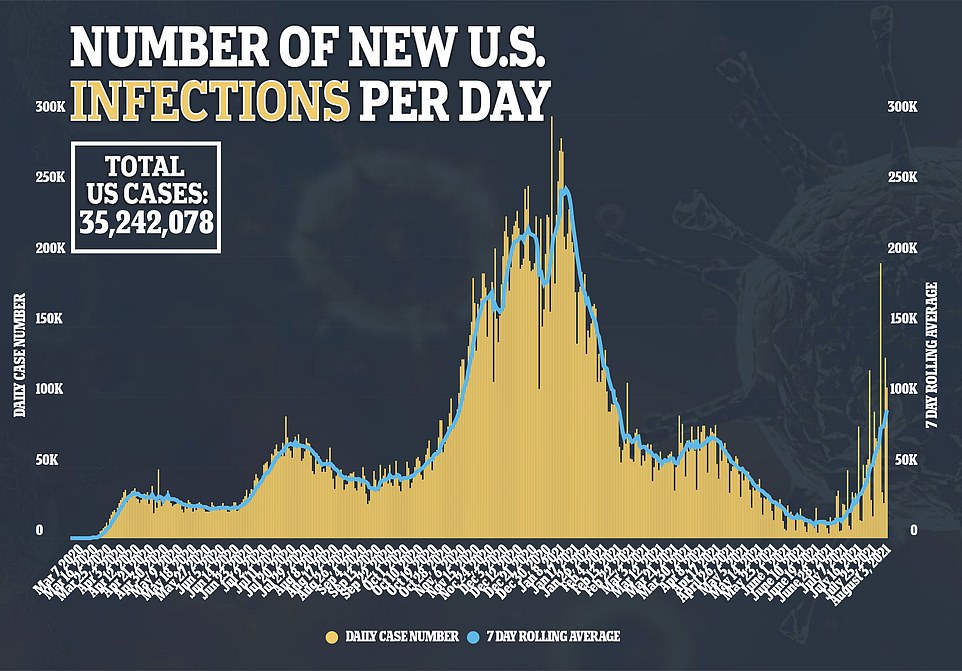
On Wednesday, the U.S. recorded 106,557 new cases of coronavirus with a seven-day rolling average of 90,576, a 283% increase from the 23,613 recorded three weeks ago and the highest average since February 14
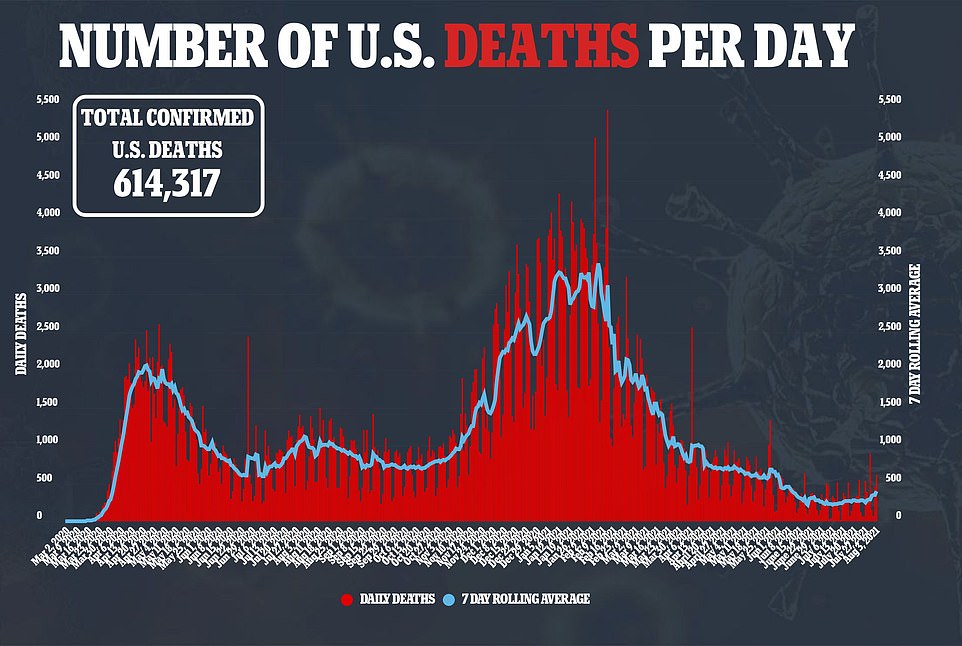
COVID-19 deaths are also rising with 616 recorded on Wednesday with a seven-day rolling average of 399, which is the highest figure since early June
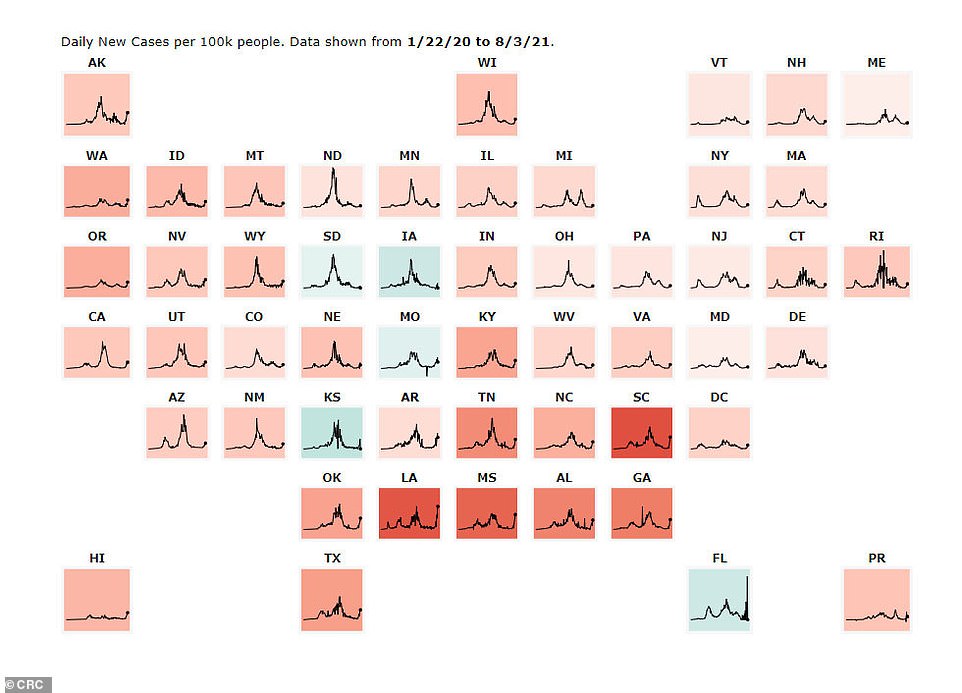
Every state, aside from Kansas, and the District from Columbia are seeing coronavirus cases either increase or hold steady in the last week
Florida is currently recording the highest number of average infections per day in the nation with 22,145 reported on Tuesday.
This means the Sunshine State has seen cases rise by 111 percent in two weeks from an average of 10,452 cases per day, a DailyMail.com analysis of data from Johns Hopkins University shows.
On Tuesday, Florida reported an all-time high of 11,515 hospitalized COVID-19 patients, according to the U.S. Department of Health and Human Services.
This not only breaks the 10,389 record set the day before but surpasses the previous record set on July 23, with 10,170 hospitalizations, before vaccines were available.
Despite the rising number of cases and hospitalizations, Florida Governor Ron DeSantis insisted on Tuesday that he will not invoke another shutdown.
‘We’re not shutting down,’ he said at a press conference.
‘These interventions have failed time and time again throughout this pandemic, not just in the United States but abroad. They have not stopped the spread. And particularly with Delta, which is even more transmissible, if it didn’t stop it before, it definitely ain’t going to stop it now.’
As of Wednesday, 58.4 percent of Floridians have received at least one COVID-19 vaccine dose and 49.1 percent are fully vaccinated, according to the Centers for Disease Control and Prevention (CDC).
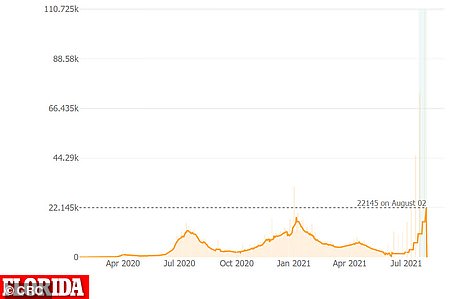
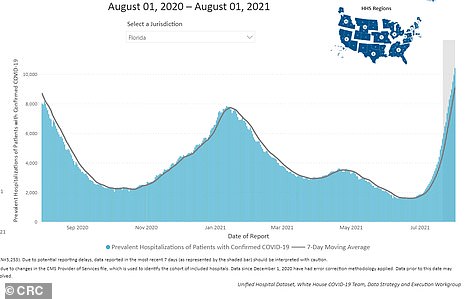
In Florida, infections have risen by 111% in two weeks from an average of 10,452 cases per day to 22,145 (left). On Tuesday, Florida reported an all-time high of 11,515 hospitalized COVID-19 patients (right)
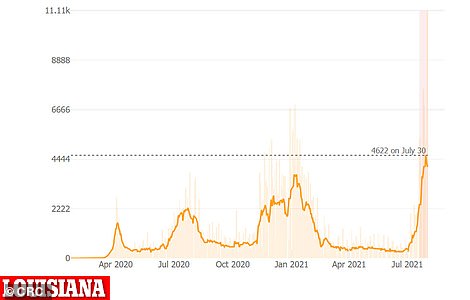
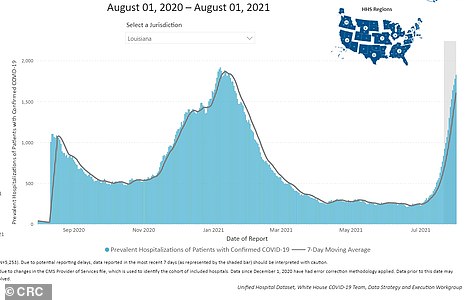
In Louisiana, cases are rising rapidly from an average of 2,414 per day to 3,965 per day (left). Currently, 2,112 patients are hospitalized with the virus, a record-high number (right)
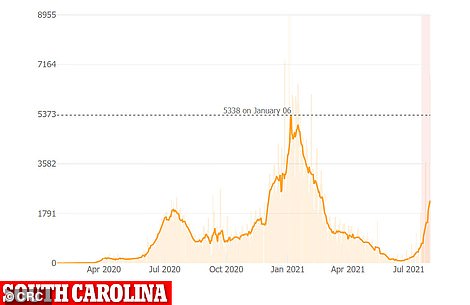
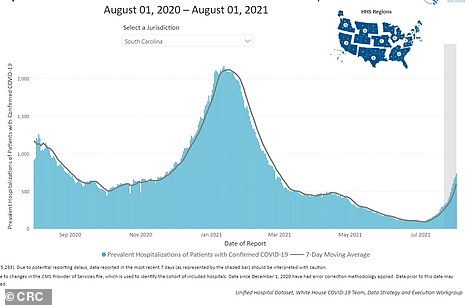
Cases in South Carolina have soared by 209 percent over the last 14 days from an average of 718 per day to 2,225 per day (left). Hospitalizations have also risen by 170 percent over the same time period from 219 patients to 593 (right)
Meanwhile, in nearby Louisiana, cases are also rising rapidly from an average of 2,414 per day to 3,965 per day, up 64 percent over the last two weeks, the DailyMail.com analysis found.
Just last week, the state recorded its highest average ever at 4,622 cases per day.
According to the state’s Department of Health, 2,112 patients are currently hospitalized with the virus, a record number and surpassing the previous high of 2,069 recorded on January 7.
It prompted Republican Governor John Bel Edwards to issue an indoor mask mandate, regardless of vaccination status.
‘Nobody should be laboring under the misapprehension that this is just another surge,’ Edwards said during a press conference on Monday.
‘We’ve already had three of these. This is the worst one we’ve had thus far.’
The state’s vaccination rate is behind the national average with 43 percent of residents having received at least one dose and only 37.1 percent fully vaccinated, CDC data show.
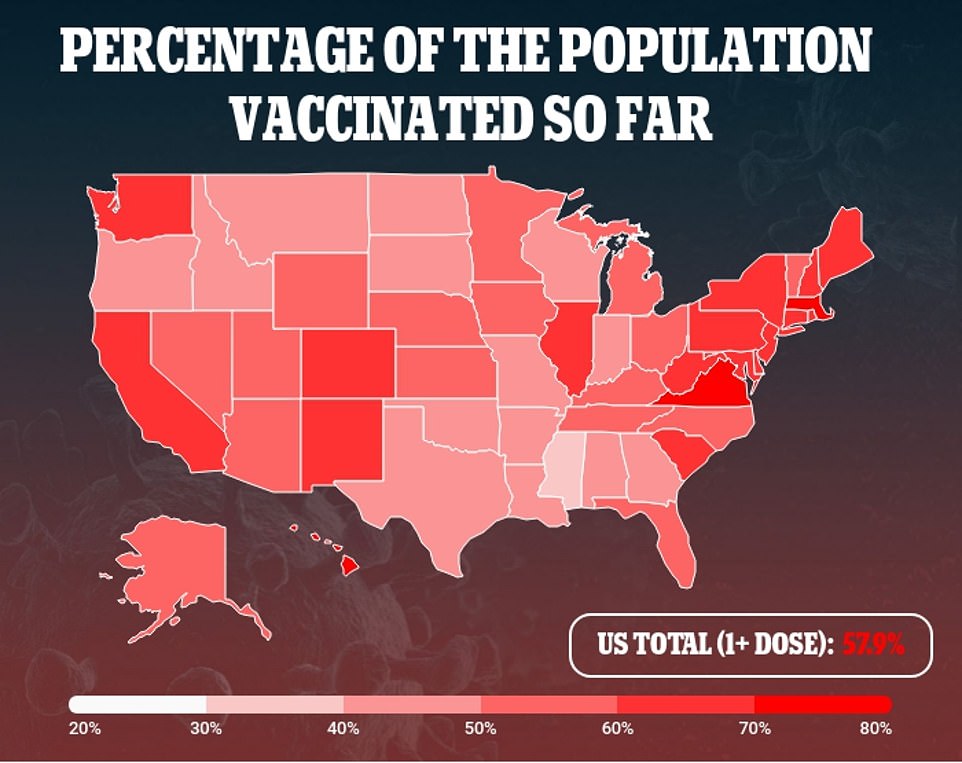
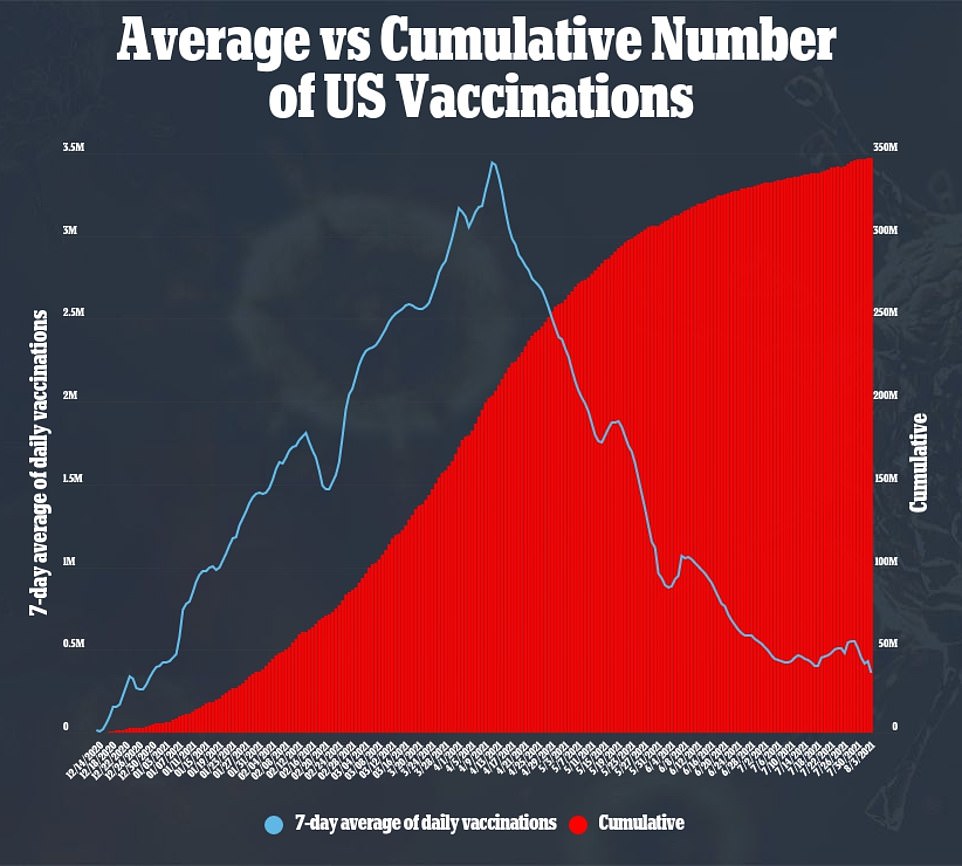
Recently, South Carolina has also been emerging as a new pandemic hotspot.
In the last two weeks, cases have soared by 209 percent over the last 14 days from an average of 718 per day to 2,225 per day, one of the biggest increases seen in the U.S.
Hospitalizations have also risen by 170 percent over the same time period from 219 patients to 593, according to data from the CDC.
The state’s Department of Health and Environmental Control says the surge is likely due to the Delta variant, which makes up more than half of all cases undergoing genomic sequencing.
Last month, the variant only made up five percent of cases, indicating a rapid increase in transmission, which DHEC spokesman Derrek Asberry said is ‘incredibly concerning,’ according to The State.
‘Given that the Delta variant has proven to be more transmissible than prior strains, the spread of it could increase faster and/or to a larger degree,’ he said.
Also to blame is the state’s low vaccination rate, with only 47.2 percent of residents having received at least an initial shot of the COVID-19 vaccine and 47.1 percent fully vaccinated.
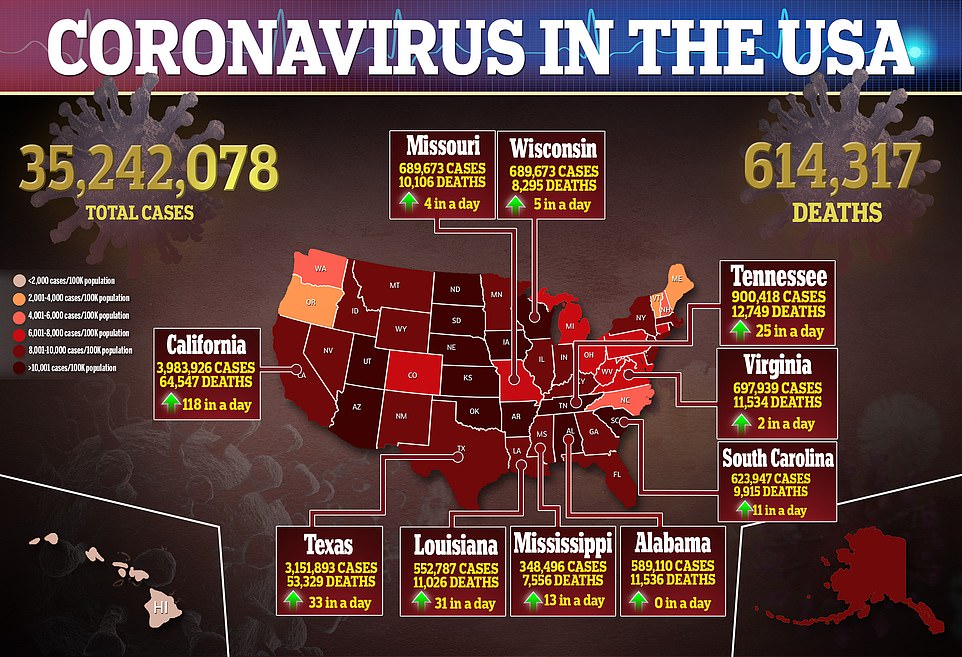
Source link : https://www.dailymail.co.uk/health/article-9861197/Average-daily-Covid-cases-surpassed-90-000-time-February.html











